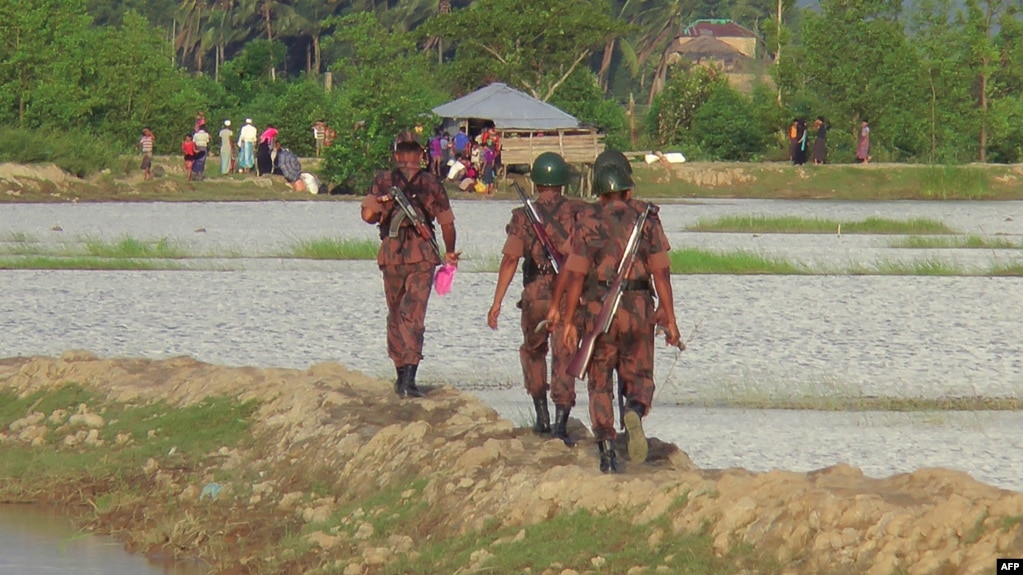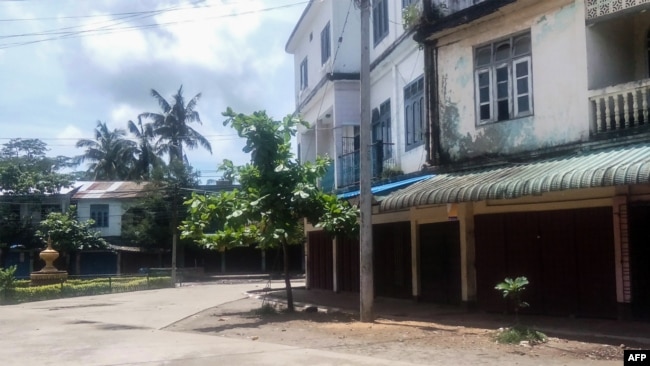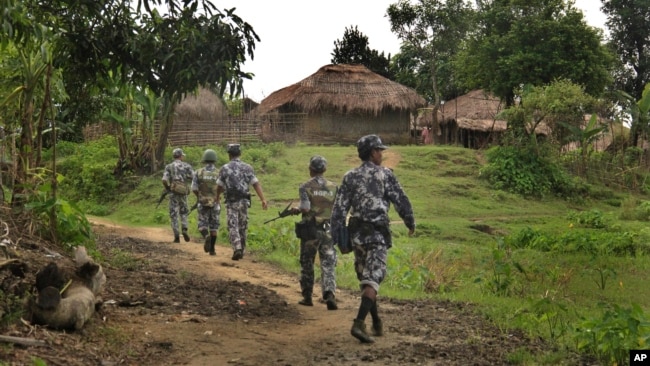The night after a series of coordinated attacks by
Rohingya insurgents in northern Rakhine State, frightened residents of
one area found themselves trapped by attackers’ land mines, and those
evacuated from another area gathered in a nearby town patrolled by the
army and police.
Authorities said police posts came under attack in
the early hours Friday by an estimated 150 insurgents armed with guns
and homemade explosives. The attackers were believed to be Muslim, a
minority in Rakhine State, where a religious divide centers on the
stateless Rohingya, who are disdained by many Buddhists and seen as
illegal immigrants from neighboring Bangladesh.
The attacks resulted in at least 71 deaths, with
Burmese officials saying 59 of them were insurgents and the rest
security personnel.
Members of the local Buddhist community, who are a
minority in the Maungdaw area, spent a fearful night after officials
warned them that attackers had mined roads in the rugged coastal area.
“We don’t want people to get hurt,” Maung Ohn, the Maungdaw representative in the Rakhine State legislature, told VOA Burmese. “Now they are trapped inside the town.”
One Maungdaw resident, a provincial government
employee, told VOA that although Buddhist Rakhines fear for their
safety, “there is no way out of here. We heard about land mines and
roadside bombs planted along main roads. Not even one vehicle dares to
drive to Buthee Taung, two hours away. We can’t go until the mines are
cleared.”
Patrolling town
Some areas of Buthee Taung remain outside official
control, said Tun Aung Thein, who represents the town in the
legislature. “There are places in a Buthee Taung suburb where security
forces cannot reach, and people from there have moved into the town
proper. That’s where about 100 people from three villages, Thabeit
Taung, Kin Chaung and Thabawh Chaung, have taken refuge, too.
“We’ve got the army and police patrolling the
downtown area because everyone’s worried … because the attacks last
night were around 1:30 in the morning. Nobody dares to sleep. They are
frightened,” Tun Aung Thein said.
The Arakan Rohingya Salvation Army (ARSA) claimed responsibility for the assaults, and warned of more.
ARSA, previously known as Harakah al-Yaqin, or “Faith
Movement,” emerged last October claiming to lead an insurgency based in
the remote May Yu mountain range bordering Bangladesh.
Myanmar’s commander in chief, Senior General Min Aung
Hlaing, said on his Facebook page late Friday that the attacks were
planned to coincide with the release of a report by former U.N.
Secretary-General Kofi Annan and to gain attention during the General
Assembly next month.
After the attacks, government forces evacuated
several dozen government staffers and their families, as well as some
400 villagers from near the Nanthataung Philanthropic School, according
to the State Counsellor Office Information Committee in Rangoon.
Myanmar's de facto leader, Aung San Suu Kyi, condemned the attacks.
“It is clear that today’s attacks are a calculated
attempt to undermine the efforts of those seeking to build peace and
harmony in Rakhine State. We must not allow our work to be derailed by
the violent actions of extremists,” she said.
The violence follows the release of a report by the Annan commission on the conditions in Rakhine State.
Urging action to heal divides
The report urged the government to take immediate
action to heal the divides and to abolish the restrictions of movement
and citizenship imposed on 1 million Rohingya in Rakhine.
After meeting with Annan on Thursday, General Min
Aung Hlaing expressed displeasure with the findings, saying Annan and
others had failed to understand what was happening on the ground in
Rakhine.
Annan commission member Aye Lwin, a prominent Muslim
and interfaith leader, told VOA Burmese on Friday that the army and
police need to mount a security operation in the area to prevent further
attacks.
“I think the best way to resolve this conflict is to
implement our recommendation as soon as possible,” Lwin said. “As
militant attacks escalate in Rakhine State, we need to tackle the
situation from all angles. Any clearance or security operation must be
handled systematically but wisely and delicately if this is to be
contained.”
The U.N. condemned Friday's attacks and said they
confirm "the significance of the government's commitment to implement"
the Annan commission recommendations.
Amnesty International said the attacks marked a dangerous escalation of violence in the area.
"We urge all sides to show the utmost restraint and
ensure that ordinary people are protected from human rights violations
and abuses," the rights group said.
The area of Rakhine closest to Bangladesh has been in
lockdown since October 2016, when years of friction between the
Rohingya and Myanmar's Buddhist majority exploded with a military
crackdown in response to attacks on border police stations that left
nine police officers dead. During the crackdown, thousands of Rohingya
fled to neighboring Bangladesh, complaining of systematic killings,
arson and rapes by Myanmar military forces.
The U.N. said the security forces' clearances have amounted to ethnic cleansing of the Rohingya.
The army and the Myanmar’s civilian government deny allegations of widespread abuses, including rapes and murders.
Ref:https://www.voanews.com/a/civilians-myanmar-trapped-after-rohingya-insurgents-ambush-police-posts/4001663.html



No comments:
Post a Comment